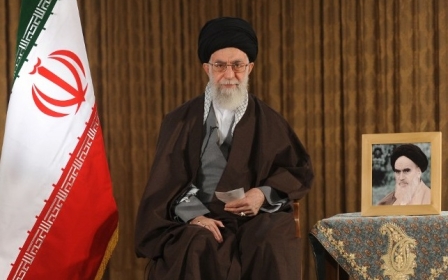Arabic press roundup: Gulf goes ballistic over Iranian missile threat

Reports of an unusually public spat between Iranian Supreme Leader Ali Khamenei and Hashemi Rafsanjani, an influential former president and key reformist ally of current President Hassan Rouhani, over the country’s recent missile tests have caught the attention of Arabic language commentators this week.
In comments published on his official website, Khamenei appeared to rebuke Rafsanjani, who last week criticised the missile tests, suggesting that “tomorrow’s world is the world of dialogue, not missiles”.
Defending the tests conducted by the Revolutionary Guard, Khamenei hit back: "Our enemies are constantly enhancing their military and missile capabilities, and given this how can we say the age of missiles has passed?"
Speaking to Saudi Arabia’s Al-Sharq newspaper, Mosa Afshar, a key Iranian opposition figure, said Khamenei was “trying to restore his respect which he lost with the nuclear agreement,” a reference to the deal between Tehran and world powers to curb its nuclear programme.
“This [Iranian] regime is criminally complicit in wars in Syria, Yemen and Iraq. This regime can't be trusted in any deal with the international community or with any other party.” Afshar added.
Also in Saudi Arabia, the Al-Sharq Alawsat newspaper highlighted Khamenei’s criticism of Rouhani’s stewardship of the economy, suggesting that Iranians were suffering and needed to protest for improved living conditions.
Writing for the Algerian Elitihadonline website, Ahmed al-Mola meanwhile speculated that Khamenei’s anger and the Revolutionary Guard’s missile tests may have been prompted by a feeling that they had been misled by the nuclear deal.
Mola urged the Gulf states to seize on Khamenei’s remarks as proof of the regional threat posed by Tehran to mobilise international opinion against Iran.
Egyptian news website Bldnaalyoum adopted a similar tone in an opinion piece by Sayed Moustafa headlined “Iranian missiles threaten the thrones of Gulf countries”.
On the other hand, columnist Ashraf al-Sabagh, writing for RT Arabic, wondered if the Americans were more afraid or angry as a consequence of the missile tests? He suggested that Washington’s main concern may be that American companies were losing out as other countries rushed to invest in Iran.
“There are some signs that Iran is now focusing on rebuilding its economy and projects in the field of energy, arms and development of weaponry by relying on Russia, China, France and Germany. The US may be unhappy that it is not leading in this regard,” said Sabagh.
Predictably, Arabic-language Iranian media suggested that the missile tests were proof of Iran’s growing strength and influence.
Speaking to Al-Alam, Mohsen Rezaee, the secretary of Iran’s influential Expediency Discernment Council, said: “We will not submit to disarmament”, while Iranian defence minister Hosain Dahqan said: “Iran doesn’t need a licence from anybody to develop its military capabilities.”
In an analysis piece for the UK-based Al-Araby Aljadeed website, Farah Alzaman Shaqi said there was popular support for the nuclear deal and greater political openness, but also hostility from hardliners.
“At a time when there is moderation and openness in Tehran's foreign policy, which has support across a wide political spectrum, it clearly appears that there is no room for compromise over the missile question. The missiles remain in the hands of the military and the Iranian Revolutionary Guard,” he said.
The Abu Dhabi-based Skynewsarabia, which often follows the foreign policy of the GCC countries, suggested that Moscow was behind Tehran’s ballistic belligerence, and that the country was trying to compensate for the loss of its nuclear programme.
“Iran is showing its muscles with these endless tests of long and medium range ballistic missiles. Iran is determined that its missiles capabilities are not part of the nuclear deal… but it has already stirred the anger of the international community,” it said.
Stay informed with MEE's newsletters
Sign up to get the latest alerts, insights and analysis, starting with Turkey Unpacked
Middle East Eye delivers independent and unrivalled coverage and analysis of the Middle East, North Africa and beyond. To learn more about republishing this content and the associated fees, please fill out this form. More about MEE can be found here.




